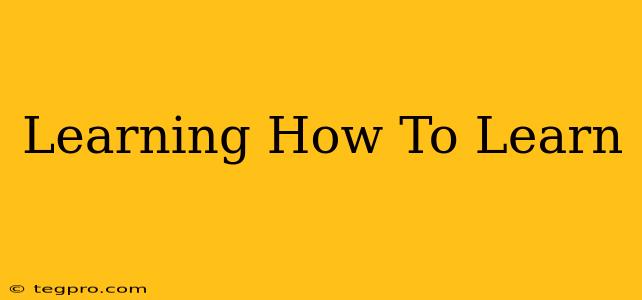Learning is a lifelong journey, but the how often gets overlooked. We often assume that simply sitting down and absorbing information is enough, but effective learning requires a strategic approach. This guide delves into practical techniques and strategies to help you learn how to learn, maximizing your knowledge retention and overall learning experience.
Understanding Your Learning Style
Before diving into specific techniques, it's crucial to understand your learning style. Are you a visual learner, thriving on diagrams and charts? Do you prefer auditory learning, absorbing information best through lectures and discussions? Or are you a kinesthetic learner, needing hands-on experience to truly grasp concepts? Identifying your dominant learning style allows you to tailor your learning methods for optimal results. Consider experimenting with different approaches to discover what works best for you.
Visual Learners:
- Utilize visual aids: Diagrams, mind maps, flowcharts, and videos are your allies.
- Color-code your notes: Make your notes visually appealing and easier to remember.
- Create flashcards with images: Combine visual and textual information for enhanced retention.
Auditory Learners:
- Record lectures and review them: Listening to the material again reinforces understanding.
- Engage in discussions and debates: Active participation strengthens memory.
- Use audiobooks and podcasts: Transform passive listening into active learning.
Kinesthetic Learners:
- Engage in hands-on activities: Experiments, building projects, and role-playing solidify learning.
- Use physical manipulatives: Models, blocks, and other tangible objects aid comprehension.
- Take frequent breaks and move around: Physical activity improves focus and retention.
Proven Learning Techniques for Maximum Retention
Once you've identified your learning style, implement these powerful learning techniques:
Spaced Repetition:
Instead of cramming, review material at increasing intervals. This technique leverages the spacing effect, significantly improving long-term retention. Use flashcards or dedicated spaced repetition software to optimize this strategy.
Active Recall:
Actively retrieve information from memory instead of passively rereading. Test yourself frequently using practice questions, quizzes, or self-explanation. This strengthens neural pathways and improves recall.
Interleaving:
Mix up different subjects or topics during your study sessions. This challenges your brain and enhances your ability to discriminate between concepts, leading to better understanding and retention.
Elaboration:
Connect new information to what you already know. Relate concepts to personal experiences, create analogies, and generate examples. This deep processing strengthens memory traces.
Dual Coding:
Combine visual and verbal information. Draw diagrams, create mind maps, or use other visual aids alongside your notes. This leverages multiple cognitive pathways for improved learning.
Creating an Effective Learning Environment
Your environment significantly impacts your learning effectiveness. Minimize distractions, ensure adequate lighting, and create a comfortable and organized workspace. Regular breaks are essential to maintain focus and prevent burnout.
The Importance of Metacognition: Learning About Learning
Metacognition, or thinking about your thinking, is crucial for effective learning. Regularly reflect on your learning process:
- What strategies worked best?
- What challenges did you encounter?
- How can you adapt your approach for better results?
By constantly evaluating and refining your learning methods, you become a more efficient and effective learner.
Conclusion: Embracing the Journey of Lifelong Learning
Learning how to learn is an ongoing process. Experiment with different techniques, find what works best for you, and adapt your approach as needed. Embrace the journey of lifelong learning, and you'll unlock your full potential for knowledge acquisition and personal growth. Remember that consistent effort and self-reflection are key to mastering the art of effective learning.

